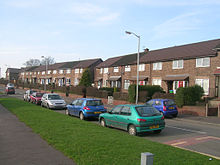
An overspill estate is a housing estate planned and built for the housing of excess population in urban areas, both from the natural increase of population and often in order to rehouse people from decaying inner city areas, usually as part of the process of slum clearance.[1][2][3] They were created on the outskirts of most large British towns and during most of the 20th century, with new towns being an alternative approach outside London after World War II.[4][3] The objective of this was to bring more economic activity to these smaller communities, whilst relieving pressure on overpopulated areas of major cities.[1] The Town Development Act 1952 encouraged the expansion of neighbouring urban areas rather than the creation of satellite communities.[5][6] The authorities wished to divert people living in poor conditions within highly populous cities to better conditions on the outskirts of these cities.[1] Overspill not only involves moving people to a new area, but requires industry and employment to follow.[7] Often the industries and resources took longer to migrate than the people, hence there were a number of issues surrounding early overspill projects.[8][9] Slum clearance tenants often had problems with the move, since it separated them from extended family and friends, needed services were often lacking, and only the better off workers could afford the extra cost of commuting back to their jobs.[10][11][1] Another criticism was that the new estates occupied what had been productive agricultural land.[1]
- ^ a b c d e Cite error: The named reference
:7was invoked but never defined (see the help page). - ^ Cite error: The named reference
:9was invoked but never defined (see the help page). - ^ a b Cite error: The named reference
:6was invoked but never defined (see the help page). - ^ Cite error: The named reference
:0was invoked but never defined (see the help page). - ^ G. C. Dickinson (April 1962). "Overspill and Town Development: In England and Wales, 1945–1971". The Town Planning Review. 33 (1): 49–62. doi:10.3828/tpr.33.1.3x8040m7345q21p2. JSTOR 40102328.
- ^ H. R. Parker (January 1956). "A Change in Housing Policy". The Town Planning Review. 26 (4): 211–14. doi:10.3828/tpr.26.4.k52524t741712578. JSTOR 40101578.
- ^ Mann, Michael (1973). Workers on the move : the sociology of relocation. Cambridge: University Press. pp. 20–197. ISBN 0-521-08701-5. OCLC 969858360.
- ^ Cite error: The named reference
:1was invoked but never defined (see the help page). - ^ Cite error: The named reference
:5was invoked but never defined (see the help page). - ^ Michael Mann (1973). Workers on the Move: The Sociology of Relocation. Cambridge Studies in Sociology. Vol. 6. Cambridge: Cambridge University Press. p. 20. ISBN 9780521087018.
- ^ Peter Shapely (February 2006). "Tenants Arise! Consumerism, Tenants and the Challenge to Council Authority in Manchester, 1968–92". Social History. 31 (1): 65. JSTOR 4287297.
© MMXXIII Rich X Search. We shall prevail. All rights reserved. Rich X Search
